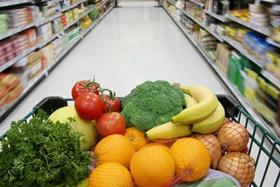
Freshfel Europe has today (10 June) released the latest edition of its annual Freshfel Consumption Monitor, which analyses the production, trade and consumption trends for fresh fruit and vegetables in the EU.
The analysis of the latest available data (up to 2013) shows that consumption in the EU stands at 341.82g/capita/day of fresh fruit and vegetables in 2013, representing a 5.6 per cent increase on 2012, but a decrease of 1.9 per cent compared with the five year average (2008-2012).
According to Freshfel, consumption levels in the EU remain under the minimum threshold recommended by the World Health Organisation (WHO) of 400g of fruit and vegetables per day - indeed, out of the 28 member states of the European Union, only six are able to meet this level of consumption (Belgium, Cyprus, Greece, Italy, Portugal and Romania).
While the average aggregate consumption of fruit of vegetables in the EU stands at 341.81g/day in 2013, fruit consumption reached 188.6 g/capita/day – 10.1 per cent more than in 2012, but still 1.5 per cent less than the five-year average.
Per capita vegetable consumption, meanwhile, stood at 153.22g/capita/day, corresponding to an increase of 0.5 per cent when compared with 2012 and of 2.3 per cent when compared with the five-year average.
“The Consumption Monitor shows that fresh fruit and vegetable consumption in the EU has slightly increased in 2013,' noted Freshfel Europe general delegate Philippe Binard. 'Nonetheless, on the longer-term perspective, it still shows an insufficient level of consumption across the EU and an overall decreasing trend. The moderate increase in 2013 is a positive signal, although the market and economic situation in 2014 and 2015 remains challenging for different reasons. The continuous low consumption makes it urgent to continue to stimulate fresh fruit and vegetable consumption.”
Freshfel said that it remained adamant in its demand for a coherent EU policy to enhance healthy eating habits for European consumers, including a resourceful and flexible fruit and vegetables school scheme, and a reinforced EU promotion policy for agricultural products.
'While the consumers are usually aware of the multiple benefits and assets of fresh fruit and vegetables, they unfortunately do not convert this knowledge into concrete consumption decisions,' binard continued. 'Efficient EU tools could help filling this gap.”
Freshfel encouraged the sector to move forward and highlight the unique features of fresh produce, such freshness, diversity, taste but also fun, pleasure, and convenience. Freshfel is also committed to obtaining better knowledge of the European consumers to better match their expectations.



